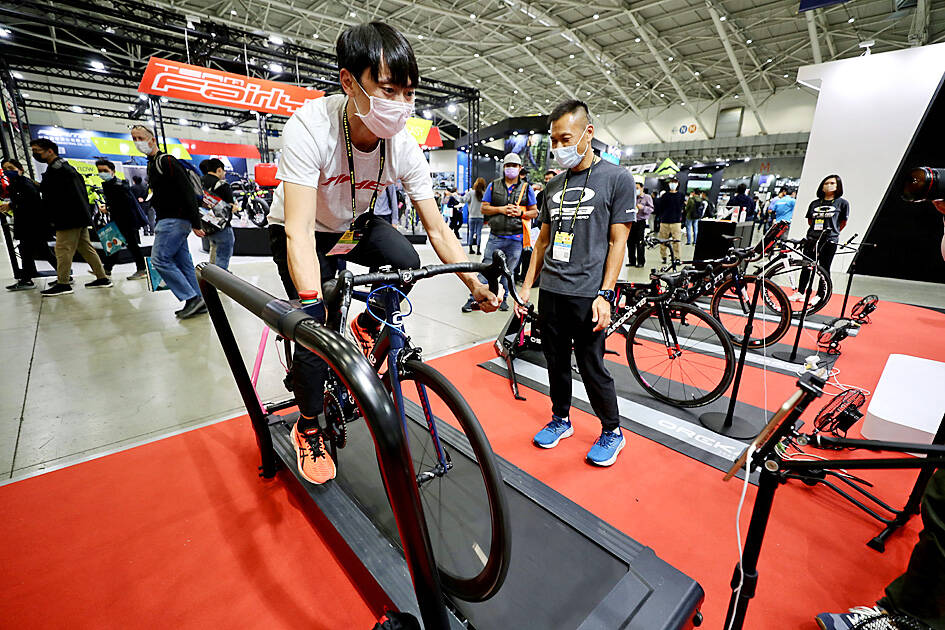Taiwan’s exports of bicycles and bicycle parts last year increased 23.11 percent annually to US$6.15 billion from US$4.99 billion the previous year, with an average annual increase of 8.2 percent over the past 10 years, the Ministry of Economic Affairs said yesterday, citing the latest customs statistics.
Bicycle parts accounted for 48 percent of the industry’s total exports, rising 26.65 percent year-on-year to US$2.95 billion, with outbound shipments of bicycle parts growing 12.7 percent annually on average in the past 10 years, the data showed.
Exports of traditional bicycles totaled US$1.63 billion last year, up 22.4 percent from 2021, but their share of the industry’s total exports fell to 26.6 percent from 26.7 percent in 2021 and from 67.5 percent in 2012 amid growing uptake of bicycle-sharing systems, the ministry said.

Photo: Ritchie B. Tongo, EPA-EFE
Exports of electric bicycles last year rose 17.7 percent annually to US$1.56 billion. The value of outbound shipments grew 57.5 percent since 2012, due mainly to a rapid growth in European and US markets, as well as the products having higher selling prices, the ministry said.
Electric bicycles accounted for 25.4 percent of the industry’s overall exports last year, compared with 26.6 percent in 2021.
The US, the Netherlands, Germany, the UK and China were the top five destinations for Taiwanese bicycles and bicycle parts last year, accounting for 63.6 percent of the industry’s total exports.
The US continued to be the largest export market last year for traditional bicycle manufacturers, and the Netherlands remained the largest market for electric bicycles, while most of bicycle-related shipments to Germany were bicycle parts.
The ministry said Taiwan’s electric bicycles have increased their market share in the US, the EU and China, thanks to more Taiwanese firms moving production of high-end models back home amid US-China trade tensions.
However, Taiwan faces rising competition from Cambodia, as the Southeast Asian country has benefited from better tariff terms for bicycle exports to Europe and the US, which have led several European and US brands to set up production bases there, the ministry said.
The EU’s imports of bicycles from Cambodia exceeded those from Taiwan for the first time in 2021, it added.

STEEP DECLINE: Yesterday’s drop was the third-steepest in its history, the steepest being Monday’s drop in the wake of the tariff announcement on Wednesday last week Taiwanese stocks continued their heavy sell-off yesterday, as concerns over US tariffs and unwinding of leveraged bets weighed on the market. The benchmark TAIEX plunged 1,068.19 points, or 5.79 percent, to 17,391.76, notching the biggest drop among Asian peers as it hit a 15-month low. The decline came even after the government on late Tuesday authorized the NT$500 billion (US$15.2 billion) National Stabilization Fund (國安基金) to step in to buoy the market amid investors’ worries over tariffs imposed by US President Donald Trump. Yesterday’s decline was the third-steepest in its history, trailing only the declines of 2,065.87 points on Monday and

TAKING STOCK: A Taiwanese cookware firm in Vietnam urged customers to assess inventory or place orders early so shipments can reach the US while tariffs are paused Taiwanese businesses in Vietnam are exploring alternatives after the White House imposed a 46 percent import duty on Vietnamese goods, following US President Donald Trump’s announcement of “reciprocal” tariffs on the US’ trading partners. Lo Shih-liang (羅世良), chairman of Brico Industry Co (裕茂工業), a Taiwanese company that manufactures cast iron cookware and stove components in Vietnam, said that more than 40 percent of his business was tied to the US market, describing the constant US policy shifts as an emotional roller coaster. “I work during the day and stay up all night watching the news. I’ve been following US news until 3am

Six years ago, LVMH’s billionaire CEO Bernard Arnault and US President Donald Trump cut the blue ribbon on a factory in rural Texas that would make designer handbags for Louis Vuitton, one of the world’s best-known luxury brands. However, since the high-profile opening, the factory has faced a host of problems limiting production, 11 former Louis Vuitton employees said. The site has consistently ranked among the worst-performing for Louis Vuitton globally, “significantly” underperforming other facilities, said three former Louis Vuitton workers and a senior industry source, who cited internal rankings shared with staff. The plant’s problems — which have not

TARIFF CONCERNS: The chipmaker cited global uncertainty from US tariffs and a weakening economic outlook, but said its Singapore expansion remains on track Vanguard International Semiconductor Corp (世界先進), a foundry service provider specializing in producing power management and display driver chips, yesterday withdrew its full-year revenue projection of moderate growth for this year, as escalating US tariff tensions raised uncertainty and concern about a potential economic recession. The Hsinchu-based chipmaker in February said revenues this year would grow mildly from last year based on improving supply chain inventory levels and market demand. At the time, it also anticipated gradual quarter revenue growth. However, the US’ sweeping tariff policy has upended the industry’s supply chains and weakened economic prospects for the world economy, it said. “Now